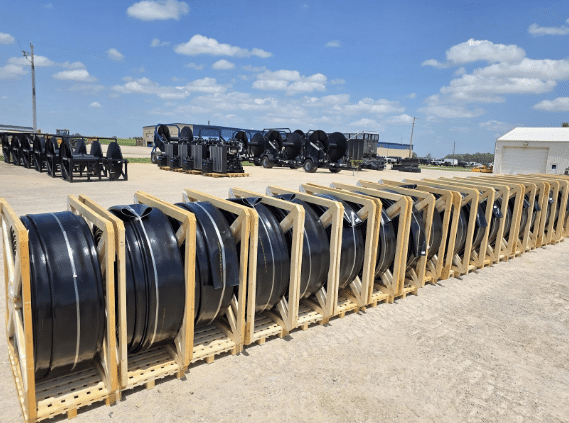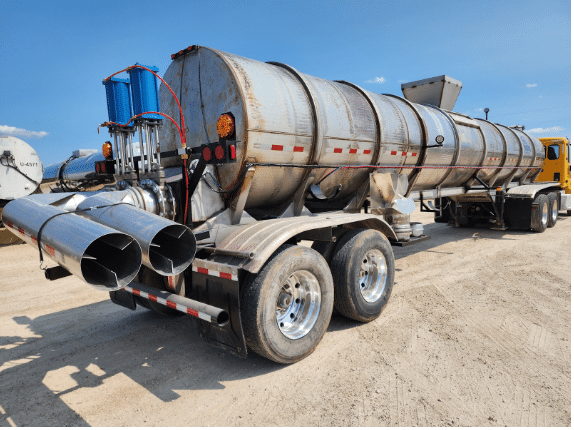Common Mistakes to Avoid When Shopping for Manure Equipment for Sale

Durable manure hose reels and fittings designed for high-efficiency liquid manure pumping systems.
Best Manure Equipment for Sale
Purchasing manure equipment for sale is one of the biggest investments a farm or custom applicator can make. The right system can dramatically improve efficiency, reduce labor costs, and extend your equipment life — but the wrong decision can lead to breakdowns, compatibility issues, and costly downtime.
Knowing what to look for (and what to avoid) helps ensure your next purchase supports your operation for years to come. Here are the most common mistakes farmers make when buying manure equipment — and how to avoid them.
Choosing the Wrong Size for Your Operation
One of the most frequent mistakes is buying equipment that doesn’t match your farm’s scale.
- Too small: A pump, tanker, or dragline system that’s undersized for your herd size or field acreage will run longer hours, wear out faster, and require extra labor to keep up.
- Too large: Oversized systems waste fuel, require more horsepower than your tractors can handle, and may not fit through gates or around lagoons.
Always match your manure handling system to your daily manure volume, field layout, and tractor power. Right-sizing ensures you get the most productivity without unnecessary operating costs.
Ignoring the Type and Consistency of Manure
Not all manure systems are designed to handle the same materials. The type and consistency of manure — whether thick dairy slurry or thin swine effluent — should dictate your equipment choice.
- Liquid systems: Require high-volume pumps, layflat hose, and dragline toolbars for field application.
- Semi-solid or solid manure: Demand mechanical spreaders, agitators, and heavy-duty beaters.
Know your manure consistency and solids content before buying. The wrong setup can lead to clogs, uneven application, or premature wear.
Focusing Only on the Purchase Price
Looking for the lowest sticker price is a common mistake that can cost more in the long run.
A cheaper unit might look appealing, but it often means thinner steel, fewer corrosion protections, and higher repair costs later. Instead, evaluate the total cost of ownership, which includes:
- Fuel and operating costs
- Maintenance and parts
- Downtime from repairs
- Resale value
Quality manure equipment pays for itself through durability, reduced downtime, and longer service life.
Overlooking Construction Quality and Corrosion Resistance

Reliable stainless steel manure tanker delivering efficient liquid waste transport for farms.
Manure is highly corrosive, especially on carbon steel and untreated components. Equipment exposed to constant slurry, acids, and moisture needs to be built to last.
Look for features like:
- Stainless steel tanks, fittings, and valves
- Protective coatings or epoxy finishes
- Heavy-wall layflat hoses designed for long-term field use
These construction details are critical — especially if your system involves pumping or storing manure regularly. Corrosion-resistant builds mean less downtime, fewer leaks, and better long-term performance.
Ignoring Compatibility with Existing Equipment
Every farm’s setup is different. Make sure your new manure equipment integrates seamlessly with what you already have.
- Verify that tractor horsepower and hydraulics can handle the pump, tanker, or agitator.
- Check hose and coupler sizes for compatibility with your existing dragline system.
- Ensure PTO speed and hitch type align with your tractors and implements.
Mismatched systems lead to frustration, inefficiency, and even safety hazards. Always check compatibility before purchase.
Skipping a Functional Inspection or Field Test
A visual check isn’t enough — especially with Best Dragline Manure Equipment for Sale. Hidden mechanical problems may not appear until the system is under load.
Before buying:
- Inspect pumps, hoses, bearings, and hydraulics for leaks or wear.
- Test agitators, injectors, and flow meters in operation.
- Look for signs of weld repairs, corrosion, or cracks.
Whenever possible, run the equipment during an actual pumping or agitation cycle. A quick demo reveals how well it truly performs under field conditions.
Ignoring Maintenance History on Used Equipment
If you’re considering used manure equipment, maintenance records are everything.
A unit with a consistent service log — oil changes, hose replacements, and seal inspections — is far less risky than one without documentation. Always ask for:
- Detailed service records or invoices
- Notes on pump rebuilds, hose replacements, and gearbox maintenance
Lack of history is a red flag. Properly maintained used equipment can perform just as reliably as new — if you know its track record.
Overlooking Parts and Service Availability
Even the best-built manure systems require maintenance. Before you buy, confirm that replacement parts and service support are easy to access.
Phil’s Pumping & Fabrication customers benefit from:
- Fast access to parts for pumps, toolbars, and hoses
- Field service and repair support
- Rental backup when equipment needs downtime
Good post-sale support is just as important as the initial purchase. Having reliable service nearby keeps you pumping when it matters most.
Investing Smart for the Long Term
Buying Manure Equipment isn’t just about solving today’s problem — it’s about building efficiency, reliability, and sustainability for years to come.
Avoiding these mistakes helps ensure you choose equipment that’s the right size, built from durable materials, and supported by a reliable dealer network.
When you invest wisely, you save money on maintenance, maximize uptime, and keep your farm running smoothly season after season.
🚜 Looking for dependable manure equipment for sale?
Phil’s Pumping & Fabrication supplies new and used manure pumps, tankers, hoses, and toolbars for farms and custom applicators across the U.S. and Canada.
Visit philspumpingandfab.com or follow Phil’s Pumping on Facebook for expert insights, equipment availability, and maintenance tips.
FAQs
- Should I buy new or used manure equipment?
Used manure equipment can be a great value if it’s been well-maintained and inspected. New equipment offers the latest technology and warranty protection — both have advantages depending on your budget and needs. - How can I ensure compatibility with my existing equipment?
Match tractor horsepower, hitch type, and hydraulic requirements to the new equipment. Verify hose sizes and couplers to ensure seamless connection. - Why is corrosion resistance so important?
Manure is highly corrosive. Stainless steel and epoxy-coated components last longer and resist breakdown from acids and moisture. - What’s the benefit of having a flow meter on a liquid system?
Flow meters provide precise application rates per acre, reducing waste, improving crop nutrition, and ensuring compliance with nutrient management plans. - What should I look for in a supplier?
Choose a dealer who offers reliable parts availability, service support, and rental options to keep your manure operation running without interruption.
